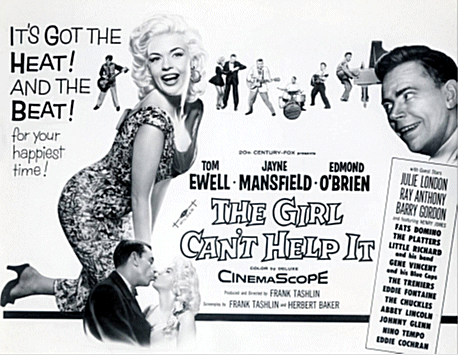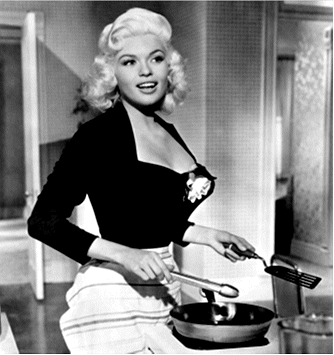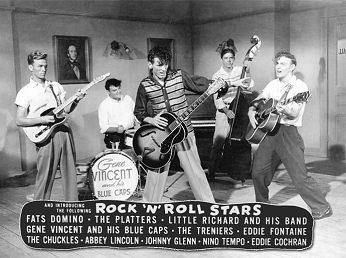Sixties
City presents
a wide-ranging series of
articles on all aspects of the Sixties, penned by the creator of the iconic
60s music paper Mersey
Beat
|
Sixties
City presents
a wide-ranging series of
articles on all aspects of the Sixties, penned by the creator of the iconic
60s music paper Mersey
Beat
|
|||||
|
 |
A cult
classic and the first rock ‘n’ roll film to be given a big budget and made
by a major studio, 20th Century Fox. The 99-minute 1956 movie, in colour
and cinemascope, was produced and directed by Frank Tashlin, who also co-wrote
the script with Herbert Baker. Tashlin, a much respected film-maker (particularly
in France), was known to take satirical bites at American popular culture
and had also been involved in cartoon series in his early career, which
he utilised to good effect in this movie. For instance, in the opening scene where Mansfield, in a figure-hugging black two piece suit and broad-brimmed hat, walks along the street to the sound of the film’s theme tune, with various men ogling her, including an ice delivery man melting a block of ice and a milkman’s bottle of milk boiling in his hand as she passes. As she walks up some stairs a man’s glasses crack! Tashlin’s comedy script satirises the American music business of the time, although in a somewhat affectionate way, and also has a similar plot line to the acclaimed ‘Born Yesterday.’Tom Ewell starred as Tom Miller, a press agent down on his luck. He’d previously starred opposite Marilyn Monroe in ‘The Seven Year Itch’. Mansfield had failed her audition for ‘Rebel Without A Cause’, but is perfect in the role of the blonde bombshell Jerri Jordan, while Edmond O’ Brien, in his only comedy role as Marty ‘Fats’ Murdock at one time parodies the King of Siam, saying “etcetera, etcetera, etcetera.” Miller was a former top press agent but had fallen in love with one of his clients, Julie London. Haunted by her image, as he wanders from room to room, he hears her voice singing her hit song ‘Cry Me A River’. Having taken to drink because of his unrequited love, he has since lost his other clients. In the meantime, mobster Marty ‘Fats’ Murdock, a former slot machine mogul who had been jailed for income tax evasion, wants to marry dizzy blonde Jerri Jordan. Jerri is grateful to Murdock because he helped her father who had been mates with him in prison. Murdock exclaims “I don’t want to marry a nobody” and decides that he’ll hire a press agent to turn his fiancée into a star and engages the reluctant Miller. Miller discovers that not only is she devoid of talent with a voice that is off-key, but she has a tendency to shriek. He decides he’ll have to sell her on her looks and begins to escort her to the various clubs around town where they watch numerous performers such as Little Richard and The Platters. |
 |
 |
They view
Eddie Cochran on television and see Gene Vincent and his group rehearsing.
Murdock won’t accept Miller’s opinion that she can’t sing and insists on
her recording a number he wrote in prison – ‘Rock Around the Rock Pile.’
They record the number with the Ray Anthony Orchestra providing the vocals
and instrumentals, while Jerri ends the song with a piercing scream. Miller finds that he is falling in love with Jerri and she reciprocates while Mousie, one of Murdock’s associates, suspects the romance and covers it up to prevent the jealous Murdock from finding out. Murdock insists that Miller makes the record a hit, but when he approaches Wheeler, a juke box king, to play it on his empire of juke boxes, Wheeler not only refuses, but prevents the record being played at all. A furious Murdock, accompanied by Mousie, then uses his muscle to replace Wheeler’s juke boxes with his own – and ‘Rock Around The Rockpile’ becomes a big hit. At a concert where Jerri is to promote her hit, a furious Wheeler, out for revenge, arrives and chases Murdock onto the stage. Frozen before the audience, Murdock finds he has no option but to sing the song he wrote. The audience loves him and Wheeler signs him to a recording contract. Miller and Jerri declare their love for each other – and are delighted to discover that Murdock is not only not angry with them, but insists on being Best Man at their wedding. Then Jerri reveals that she can sing, but has never wanted fame, all she wants is to marry and have lots of kids. The songs in the film are: ‘The Girl Can’t Help It’, ‘Ready Teddy’, ‘She’s Got It’ (Little Richard); ‘Tempo’s Tempo’, (Nino Tempo); ‘My Idea of Love’, ‘I Ain’t Gonna Cry No More’, (Johnny Olenn); ‘Twenty Flight Rock’, ‘Cool It Baby’, (Eddie Cochran); ‘Cinnamon Sinner’, (Teddy Randazzo & The Three Chuckles); ‘Spread The Word’, (Abbey Lincoln); Cry Me a River’, (Julie London); ‘Be-Bop-A-Lula', (Gene Vincent & The Blue Caps); ‘Rock Around The Rock Pile’, (The Ray Anthony Orchestra); ‘Rocking Is Our Business’, (The Treniers); ‘Blue Monday’, (Fats Domino) and ‘You’ll Never Know’, (The Platters). Jayne Mansfield lip-synched to the song ‘Every Time You Kiss Me’. Bobby Troup was responsible for the music score and a few years later he married Julie London. |
|
Article
Text
UK
web hosting by
|